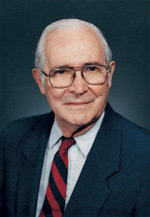Dr. James White debates Roman Catholic apologist Peter D. Williams on the subject of indulgences. This debate took place on June 4, 2018 at All Saints Church in Belfast Northern Ireland.
Category Archives: Debate
You don’t agree? … so what?
REJECTION IS NOT REFUTATION
Dr. Don Kistler, founder of the Northampton Press, was born in California in 1949, the second of five sons of Jack and Faye Kistler. He grew up on a dairy farm in Central California and graduated from Azusa Pacific College in Southern California in 1971 with a double major in public speaking and religion. He holds the M. Div. and D. Min. degrees, and is an ordained minister. Prior to entering the gospel ministry, Dr. Kistler coached high school and college football for over 15 years.
Dr. Kistler pastored a local church for four years. As part of his preaching and teaching ministry, he has spoken at conferences with such notable figures as Dr. John MacArthur, Dr. R. C. Sproul, Dr. D. James Kennedy, Dr. J. I. Packer, Dr. John Gerstner, Elisabeth Elliot, Dr. Sinclair Ferguson, Dr. Michael Horton, Rev. Alistair Begg, Dr. Albert M. Mohler, the late Dr. James Boice, and Rev. Eric Alexander, to name just a few.
Dr. Kistler is the author of the book A Spectacle Unto God: The Life and Death of Christopher Love, and Why Read the Puritans Today? and is the editor of all the Soli Deo Gloria Puritan reprints. He was a contributing author for Justification by Faith ALONE!; Sola Scriptura; Trust and Obey: Obedience and the Christian; Onward, Christian Soldiers: Protestants Affirm the Church; and Feed My Sheep: A Passionate Plea for Preaching.
He has edited over 150 books. He currently resides in Orlando, FL.
(The following is a transcript I wrote, taken from Lecture 2 of a seminar on Jonathan Edwards by Dr. Don Kistler, at Saint Andrews Chapel, Sanford, Florida, September 2003.)
Dr. Don Kistler – “People will often say “I don’t agree with you” but what does that prove? So what?”
“Let me tell you how this was driven home to me by the late Dr. John Gerstner. I was his pastor for four years (and you think you have pressure on the job). We used to drive to a Bible Study and I’d gotten a question in the mail from someone about Sabbath breaking (someone who was a very strict Sabbatarian) and they asked if anyone who did not keep a very strict Sabbath could REALLY be a Christian (that was the essence of the question).
I always drove Dr. Gerstner in his car and so I asked him, “how would you respond to this question?” I realized, you don’t ask him questions. He asks the questions.
Dr. Gerstner said, “Lets suppose for the sake of the argument that you are a practicing Sabbath breaker and I am a practicing homosexual.” He says, “Are you going to heaven or to hell?”
I said, “I’m going to heaven.” 
He said, “Am I going to heaven or to hell?”
I said, “You’re going to hell.”
He said, “So you’re violating one of God’s commands and you get to go to heaven but I am violating one of God’s commands and I have to go to hell. What is it, did I pick the wrong command, Don?”
“Well,” I said, “the scripture is not as emphatic about Sabbath breaking as it is about homosexuality. Paul calls that the lowest form of degradation that there is. The Bible never calls Sabbath breaking an abomination… errr.. how’s that?”
Gerstner responded, “How’s that?… How’s what?”
I said, “my answer.”
He said, “what answer? You fumbled around and tried to throw a few verses at me. Did you think you were going to intimidate me with a couple of verses? Now do you have an answer to my question or not?”
Panting for breath I said, “well, good and godly men have disagreed over the issue of the Sabbath, you know Calvin and Luther and your man Sproul.”
He said, “ok, Calvin and Luther and Sproul and you and me will all be in hell together. Now what is your response to my question? Why is it YOU get to go to heaven and you can violate a command of God and I can’t violate a command of God but I have to go to hell. What kind of a system are you running here?”
Well I am really sweating bullets… and so we pull up to the place we are going and I ask, “what’s the answer?”
He said, “we’ll talk about it on the way home.”
“On the way home? That’s another hour!”
Well he did this all the way home and when we got there I said, “now tell me what the answer is.”
He said, “we’ll do it next month.”
“No, we’re not doing it next month. I want to sleep between now and next month.” Continue reading
Do We Need The Cross For Salvation?
A Debate with Adnan Rashid & Dr. James White.
“On Wednesday, January 17, 2018, Sovereign Nations held a Christian and Islamic debate on the thesis “Do We Need the Cross for Salvation?” The debate was purposed by Sovereign Nations in the interests of promoting polemic, scholastic and respectful dialogue between Christians and Muslims.
Upholding the affirmative Christian position was scholar and apologist Dr. James R. White of Alpha and Omega Ministries while the Muslim position was presented by scholar Ustadh Adnan Rashid. The debate was moderated by Sovereign Nations’ Founder, Michael O’Fallon.
There are major theological divides that separate Christianity and Islam. One of the most difficult to unwind is the denial of the crucifixion of Jesus in Muslim tradition.
The penal substitution of Jesus Christ on the cross at Calvary for the sins of his elect, His resurrection and assumption are the foundational to the doctrine of justification in Christianity. Christians believe that on the cross, Jesus voluntarily bore our sins. Jesus allowed people to lie about him and kill him. He used the evil done to him to bring good to others. He sacrificed himself and demonstrated the greatest love of all. On the cross is where we are redeemed, and it is where a Christian’s sin debt to God is canceled.
There are major theological divides that separate Christianity and Islam. One of the most difficult to unwind is the denial of the crucifixion of Jesus in Muslim tradition.
Though the assertion that Jesus did not die on the cross appears in only part of one difficult verse in the Qur’an, scholars agree that the majority view within Islam is that the Qur’an affirms categorically that Christ did not die on the cross and that God raised him to Godself.”
The Marian Dogmas Debate
Can A Christian Lose Their Salvation?
Debate/Dialog: Is the Jesus of Mormonism the Jesus of the Bible?
Debating Debate
 In my opinion Steve Camp is quite mistaken here in the stance he takes regarding debate with unbelievers. He wrote on his Facebook page:
In my opinion Steve Camp is quite mistaken here in the stance he takes regarding debate with unbelievers. He wrote on his Facebook page:
ITS AN EFFORT IN FUTILITY TO DEBATE NONBELIEVERS, ESPECIALLY MUSLIMS, when I came to you, brothers, did not come proclaiming to you the testimony of God with lofty speech or wisdom. For I decided to know nothing among you except Jesus Christ and him crucified.” – 1 Cor 2:1-2. It’s the gospel … that any nonbeliever needs to hear (Mt 16:24-26; Acts 17:1-3, 17-39; Rom 10:9-10, 15:20-21; 2 Cor 4:5-6; Eph 2:8-9; 1 Pt 3:15). When witnessing of your faith in Jesus do not try and argue someone into believing on the Lord Jesus Christ, but give a reason for the hope that is in you. And do so with gentleness and respect. Amen?
***********
Here is Dr. James White’s response:
Sorry, Steve, no amens from the man you are talking about. Not after I looked into the face of a young man after the debate at Kensington Temple in London Friday evening and heard him say, “Three years ago I was a Muslim, but through the instrumentality of your debates, I have come to faith in Jesus Christ, and your work continues to strengthen my faith.” Not after talking to Muslims afterward who said, “You are consistent—you clearly try to represent us accurately. You make me think.” Not after talking to many young people excited about their faith and emboldened to go out and proclaim the gospel as a result. No, you can have your quiet, far-away-from-the-frontlines amens, but I, and those others, won’t be joining the chorus.
I have no idea why you have changed your position so radically over the past decade or so, Steve. But I would like to challenge your biblical argumentation, as brief as it was.
First, you cite 1 Corinthians 2:14-16, as if this text indicates it is “futility to debate…Muslims” on essential Christian doctrine. Could you explain the relevance of the text? You well know, Steve, that I do not believe I can argue anyone into the kingdom of God. Unless the Spirit takes out the heart of stone and gives a heart of flesh, there can be no salvation. So I suppose if you were talking about an Arminian debater pleading with a Muslim to “change their mind” or something of the sort, maybe I could see some kind of application. But most of the folks reading your words know who I am, and well know I do not believe that my arguments are going to somehow force anyone, including my Muslim debate opponent, into capitulation to the lordship of Christ.
But how do you come to the conclusion that it is “futility” to proclaim the gospel to Muslims? You have, in the past, intimated that the gospel is not central to our debates. Those who attend them, and listen to them, know differently. The gospel is always there, even when the topic is on another aspect of the Christian/Muslim conflict. So when I defend the Trinity, or the resurrection, or biblical reliability to Muslims—you do not think the Spirit of God can use this in drawing the elect to the Savior? There is no place for removing stumbling blocks in the life of those in whom the Spirit of God is working? Are you sure that is what Paul was addressing?
You boldly assert that these debates “do not further the kingdom of God nor can it bring someone to salvation.” I do not know what has caused you to turn against Christian apologetics, but it is hard not to come to the conclusion that you have. When believers are emboldened and encouraged, this does not further the kingdom of God? When the Lordship of Jesus Christ is proclaimed over all mankind, this does not further the kingdom of God? When falsehoods raised against the faith are refuted and shown to be empty, this does not further the kingdom of God? The kingdom of God is only furthered in the singular repetition of the Four Spiritual Laws? Surely you do not believe such things.
Upon what basis do you decide to limit the actions of the Spirit of God as to how He can bring His elect to salvation? Since I know of many who have, in fact, experienced salvation for whom the means of debates was vital, I simply have to say your assertion flies in the face of reality. But more importantly, it flies in the face of apostolic example as well. When Paul went into the synagogue and ????????? ??? ????????????? (17:3), do you think there was no opposition, no interaction, just one-sided proclamation? Notice that ????? ?? ????? ??????????—but not all. Had Paul wasted his time with the others? Surely not. And have you ever pondered why Luke used the imperfect when he wrote, ??? ???????? ??????? ?? ????????? ??? ??????? (18:4)? And pray tell, Steve: would you have taken to Facebook to rebuke Apollos. You know the text:
And when he wanted to go across to Achaia, the brethren encouraged him and wrote to the disciples to welcome him; and when he had arrived, he greatly helped those who had believed through grace, for he powerfully refuted the Jews in public, demonstrating by the Scriptures that Jesus was the Christ. (Acts 18:27–28)
Evidently, Christians can be encouraged by a powerful refutation of error and opposition, even when there is no mention of a positive “gospel response” upon the part of those thusly refuted! Have you considered this in coming to your dogmatic conclusion that God simply cannot use apologetics to bring people to faith?
You finished your statement by refuting what you had said before—at least in the obvious context of taking a shot at me and the wonderful evening of testimony at Kensington Temple (or even the debate a few days earlier at the University of Johannesburg in South Africa). Everyone knows I do not believe I can argue anyone into the kingdom, and everyone knows I believe firmly in obeying the actual command of Peter in the key apologetics text, which is not the apologia part—it is the ?????? ?? ??? ??????? ???????? part. And my presentation in both places was in perfect harmony with that text. If you think otherwise, I invite you to provide examples from a careful review of either/both debates where I did not seek to fulfill that command. Until then, I invite you to reconsider your opposition to apologetic ministry to Muslims, and to realize that your insistence that the gospel is not being proclaimed in these events is, to put it quite bluntly, blatantly untrue, contradictory to the documented evidence, and irresponsible.
Debate: The Trinity – Man-made or Divine Doctrine?
Are the Quran/Bible Books of Peace? (Debates)
Debate: Is the Quran a Book of Peace? Shabir Ally (Muslim) vs. David Wood (Christian)
Is the Quran a book of peace? Is Islam a religion of peace? Did Muhammad preach a message of peace and tolerance? In this debate, Shabir Ally (Muslim) and David Wood (Christian) scrutinize a variety of Quran verses to determine whether the Islam commands Muslims to live in peace with unbelievers.
Is the Bible a book of peace? Christians point to Jesus’ commands to “Love your neighbor as yourself” and “Love your enemies and pray for those who persecute you” to prove that Christianity is a religion of peace. However, the Bible also contains reports of Joshua invading the land of Canaan, Saul fighting the Amalekites, etc. So what’s the Biblical position on peace and violence? In this debate, David Wood and Shabir Ally go through the text to get to the truth.

